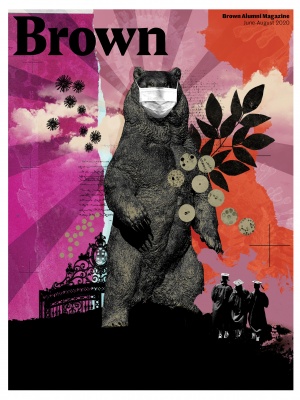I am writing this column in mid-April, a little more than four weeks after the campus transitioned to remote operations. Each day, I walk from my house to the College Green while maintaining appropriate social distance. Although it’s been lovely to see the trees come into bloom, the absence of students—hanging out after class, playing Frisbee, and studying under the elms—is incredibly sad.
And it feels strange to not be doing what I normally do at this time each year: writing Commencement remarks and preparing for thousands of alumni to come to College Hill for Reunion. I hope many of you will come to march with your classes at our rescheduled Commencement and Reunion, which will take place sometime next year.
It is in times of crisis that the character and values of individuals and communities become even more apparent. And I am glad to tell you that the response of the Brown community to the COVID-19 pandemic has been nothing short of extraordinary.
In the span of just a few weeks, staff mobilized to help undergraduate students get home safely, faculty transitioned to remote teaching with creativity and thoughtfulness, and Brown employees quickly reimagined how to do their jobs remotely.
In addition, the Brown community stepped up to support Rhode Island healthcare agencies and providers. Employees and alumni donated thousands of N95 masks. Chemistry professors manufactured hand sanitizer and engineering professors worked on 3-D printed ventilators. Medical school faculty made COVID-19 testing materials in their labs. And many of Brown’s clinical faculty members and medical school alumni continue to be on the front lines.
In Rhode Island, as in the rest of the country, businesses have closed, unemployment has spiked, and many families are feeling the economic pain of the pandemic. In response, Brown joined in local efforts to support nonprofits that offer direct services to those in need, and our Dining Services workers launched a community meals initiative in partnership with the City of Providence to provide sustenance to families that are facing food insecurity.
The response of the Brown community to the COVID-19 pandemic has been nothing short of extraordinary.
Despite being in an uncertain and difficult time, the Brown community has demonstrated how we can come together and overcome challenges. We will need to continue to rely on the strength of our community in the months ahead as we make plans to reopen the campus and address the financial difficulties created for the University by the pandemic.
So many members of the Brown community have asked me how they can help and have offered support in a multitude of ways. I am deeply grateful. While our students may be scattered across the globe, we remain committed to their academic development as well as their health and well-being.
There are a number of ways alumni can get involved in supporting our students during this unprecedented time. The pandemic is making it difficult for students to seek and obtain summer opportunities. Although we have already waived the summer earnings requirements in students’ financial aid packages—replacing these with grants—students continue to need high-quality experiences and mentoring. For those of you who are interested in helping, I hope you consider volunteering to provide students with career advice or remote opportunities for summer internships through BrownConnect.
We also have many students with unexpected needs and financial obligations. Brown established the Student Emergency Support Fund, a special new initiative within the Brown Annual Fund that will assist students in need during this critical time. If you are able, a gift to this fund provides financial support to students most adversely impacted by the pandemic.
We are living through an extraordinarily challenging time. I recognize that this health and economic crisis is affecting many of you personally and professionally and creating stresses that none of us could have imagined only a few months ago.
It has been gratifying to see how, despite these multiple challenges, members of the Brown community have come together to support one another. I have no doubt that as we work together, Brown will emerge from this crisis as a stronger university and a more tightly knit community.





